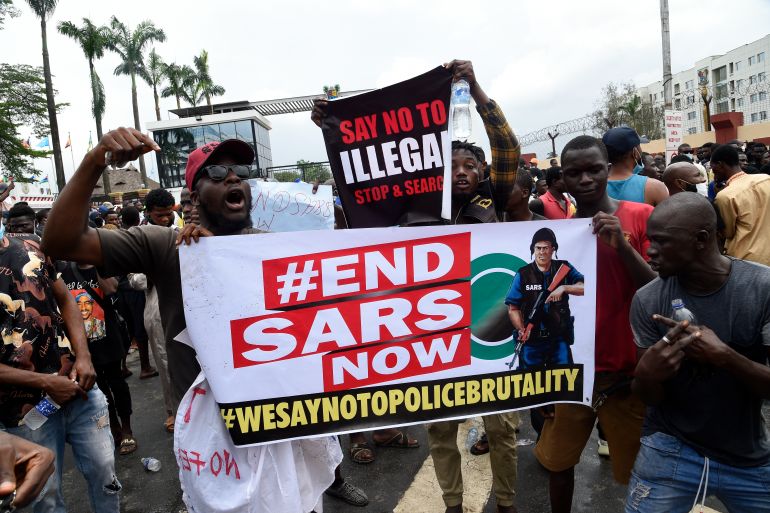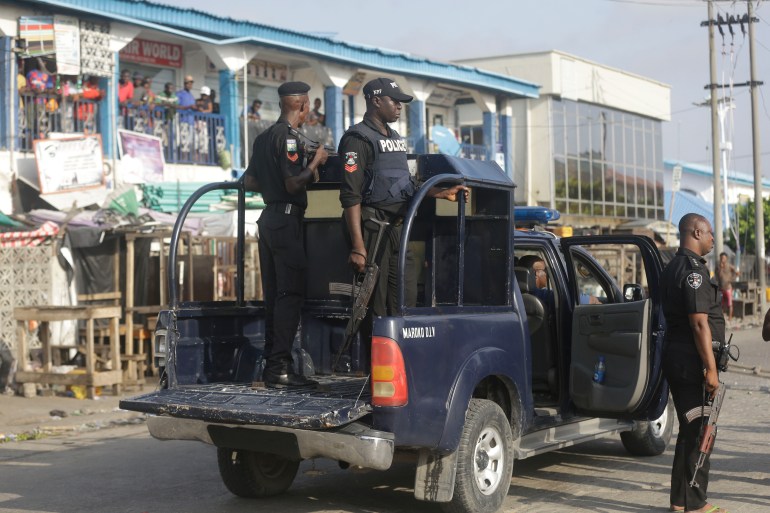SARS: Why are tens of thousands of Nigerians protesting?
Tens of thousands of Nigerians have been taking to the streets for more than two weeks to protest against police brutality.

For two weeks, Nigeria has been rocked by protests that erupted against police violence and evolved into broader anti-government demonstrations, leading to a deadly crackdown.
Young people mobilising through social media began staging demonstrations calling for the abolition of the federal Special Anti-Robbery Squad (SARS), which has long been accused of unlawful arrests, torture and extrajudicial killings.
Keep reading
list of 3 itemsNigeria deploying anti-riot police as curfew imposed in Lagos
The Nigerian protests are about much more than police violence
The hashtag #EndSARS has been trending not just in Nigeria but across the world for several days.
What is SARS?
SARS was a special police unit set up decades ago as Nigeria, Africa’s most populous country, battled rising levels of crime and kidnappings.
Initially, it was successful in reducing cases of violent crime but more recently the unit had been “turned into banditry”, according to Fulani Kwajafa, the man who set up SARS.
In June 2020, Amnesty International released a report that documented at least 82 cases of torture, ill-treatment and extrajudicial execution by SARS between January 2017 and May 2020.
What triggered the protests?
The protests were sparked by a viral video allegedly showing SARS officers killing a young man in the southern Delta state. Authorities denied the video was real.
The man who filmed the video was arrested, provoking even more anger.
What are the protesters’ demands?
With the demonstrations against SARS growing in size, the government on October 11 was forced to dissolve the controversial unit on October 11.
“The disbanding of SARS is only the first step in our commitment to extensive police reform in order to ensure that the primary duty of the police and other law enforcement agencies remains the protection of lives and livelihood of our people,” President Muhammadu Buhari said.
Authorities later ordered all personnel to report to the police headquarters in the capital, Abuja, for debriefing and psychological and medical examination. Meanwhile, the forming of a new Special Weapons and Tactics (SWAT) team was announced to replace SARS.
However, the announcements did not satisfy protesters, who viewed them as just another renaming exercise and pledged to stay on the streets until their demands are met.
These include the immediate release of all arrested protesters; justice for all deceased victims of brutality; and appropriate compensation for their families.
Protesters also call for an independent body to oversee the investigation and persecution of all reports of police misconduct; psychological evaluation and retraining of all disbanded SARS officers before they can be redeployed,; and an increase in police salary so they are adequately compensated for protecting the lives and property of the citizens.
Many are also calling for more wide-sweeping change in Nigeria, which has the largest number of people living in extreme poverty in the world and a massive youth unemployment rate.

“It became very clear very quickly that the protest cannot just be about SARS, because the kind of abuses that are documented with SARS squad are also something that has become part of everyday life of Nigerians in their contact with figures of authority across the board,” Annie Olaloku-Teriba, Nigerian affairs analyst, told Al Jazeera.
“The gross inequality, which we’ve seen, has meant that the young people going out on streets feel like it is a fight for survival.”
Olaloku-Teriba said “the government’s response has just been to use water cannon and open fire on protesters and they [demonstrators] are experiencing that brutality which is only making the demands of the protests broaden.”
Despite massive oil wealth and one of Africa’s largest economies, Nigeria’s people have high levels of poverty and lack of basic services, as a result of rampant corruption, charge rights groups.
How many people have died in protests?
On October 13, thousands of people took to the streets in a string of cities, bringing traffic to a standstill in Nigeria’a economic hub and largest citym Lagos.
Two days later, the military issued a statement warning “troublemakers” and stressed it remained “highly committed to defend the country and her democracy at all cost”.
On October 19, Amnesty said at least 15 people have died since demonstrations started, including two police officers.
The following day, as anti-riot police units were deployed nationwide and a round-the-clock curfew was imposed in Lagos, witnesses and rights groups said soldiers opened fire on demonstrators who had defied a curfew in Lagos.
The Lagos governor initially said 25 people were wounded but that there were not fatalities during the incident in Lekki toll plaza in Lagos. He later said the authorities were investigating the death of one person who suffered “blunt trauma” to the head.
But later on Wednesday, Amnesty said it had confirmed that “the Nigerian army and police killed at least 12 peaceful protesters yesterday at two locations in Lagos. Killings took place in Lekki and Alausa, where thousands were protesting police brutality.”

Have the protests spread across the world?
The #EndSARS protests have taken place in several cities across the world including, London, Berlin, New York and Toronto.
Several celebrities such as Beyonce Kanye West, John Boyega, Diddy and Rihanna and Manchester United footballer Odion Ighalo have voiced their support for the protesters online.
On Tuesday, former US Secretary of State Hillary Clinton called on President Buhari and the Nigerian army “to stop killing” protesters.
I’m calling on @mbuhari and the @hqnigerianarmy to stop killing young #EndSARS protesters. #StopNigeriaGovernment
— Hillary Clinton (@HillaryClinton) October 20, 2020